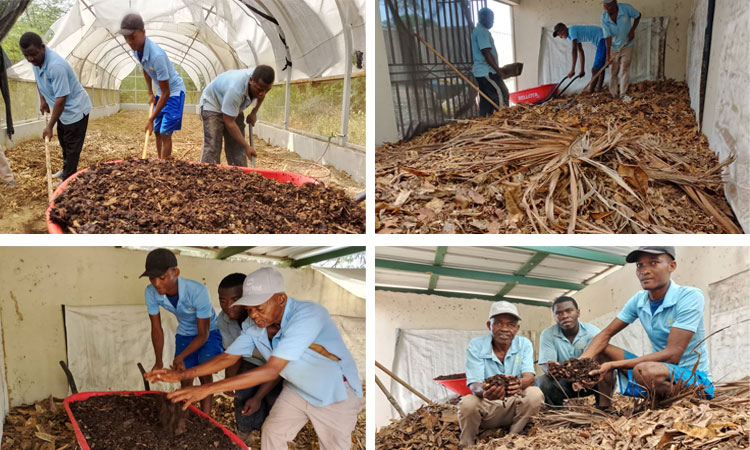I guess one advantage Haiti has over the US is that they have no stores for gardeners to buy commercial fertilizer, so Haitians typically must “make their own” fertilizer. This works out well because the easily made organic fertilizer is much better for the plants and the ecology.
This week, Wilner and the ATC (Agricultural Training Center) staff started another large compost project near the large Vergé garden, where so much of the food for the five Love A Child kitchens is grown.
Composting is a natural process of decomposing organic matter, like yard waste, weeds, grasses, leaves, etc. In the US, we often use kitchen scraps, too, but those are hard to come by in Haiti. Composting sets up an ideal environment for the natural process to happen, so that it happens faster than in nature. Composting relies on microbes, bacteria, fungi, etc. to break down the organic matter into basic Nitrogen, Phosphorus, Potassium, and minerals.
The science of composting is in two types: Anaerobic (without access to air) and Aerobic (with access to air). When air is present, there are more microbes that can break down the material, and it is faster, doesn’t smell, and builds up heat that usually kills weed seeds and unfavorable pathogens. Composting without air (anaerobic) takes longer, is colder, usually wetter, and smellier.
Here are pictures of our new large compost project using general yard debris that the crews clean up routinely. This “brown” (dead and dry) material will be layered with “green” material (fresh-cut grass, weeds, etc.), a little bio-char, and a little soil to introduce the microbes and fungi and water. After three months or more, all that material will be reduced to sweet-smelling, rich, organic fertilizer. Praise God for His provision of our organic fertilizer.
This is an important “Development for Sustainability” project, helping Haitians learn how to help themselves. Thank you to all the donors who help support this part of the ministry.
Rad Hazelip, Assistant Executive Director


